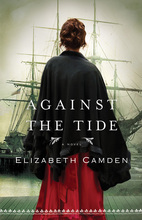 Elizabeth Camden's Against the Tide is an excellent sequel to her earlier novel, The Lady of Bolton Hill. In some ways, the two novels are primarily about Alexander Banebridge - though he was the villain of Lady, it was the story of how he came to Christ, and Tide shows us where he went from there, tying up loose ends and taking out the real villain.
Elizabeth Camden's Against the Tide is an excellent sequel to her earlier novel, The Lady of Bolton Hill. In some ways, the two novels are primarily about Alexander Banebridge - though he was the villain of Lady, it was the story of how he came to Christ, and Tide shows us where he went from there, tying up loose ends and taking out the real villain. Camden's hero and heroine are good, strong characters, but they have their weaknesses, making them real. Bane suffers from an obsession with rooting out opium smugglers, specifically the man who formerly controlled him, but to the point where his noble intentions almost entirely deprive him of love and friendship, since whoever he cares for could be taken and used against him by the Professor. 1st John 4:18 specifically states that "There is no fear in love." Lydia feels the need to control her small, concise, and well-ordered world; besides which, she is addicted to opium and refuses to acknowledge its hold on her.
Lydia's salvation is a good reminder that not everyone has such a quick, dramatic conversion as Bane himself did, like Saul (who became the apostle Paul), or the wicked king Manassah. As Bane says, "Don't be like the person who tears the scab off the wound every morning to see if has healed. Just keep seeking and trusting." (341). It takes time to reach the point of complete trust. One thing I would have liked to see more of in the novel was trust on Bain's part - namely, trust in God to see things through, not just reliance on himself.
While The Lady of Bolton Hill is an introduction to opium issues in America, Against the Tide makes it personal, as one of the main characters is an unsuspecting addict. Even when confronted with the addiction, she is quick to claim it as only an occasional cure against a headache, not a real addiction. How many addictions do we deal with, but daily deny? Not all are technically harmful to one's physical health - computer games, reading too many books, watching too many movies. But what about turning to food to make one feel better, or to men? It's so easy to rely on men for feelings of self worth. Like Lydia, we think, "It's not an addiction, I can quit any time," but really, can we? And what if we try to replace it with something else - switch from masculine attention to chocolate? That is no good either! Replacing one addiction with another is not the solution, but replacing the addiction with God is. The moments you want to fall back on that old habit, don't! Spend that time with Him!
Overall, I found it to be an excellent book, and I give the novel five stars (and, incidentally, it happens to be the Christy Awards winner for Best Historical Romance for 2013). Bethany House Publishers provided a free copy of this novel for an honest review as part of their book review program; I was not obligated to make it a positive one.
No comments:
Post a Comment